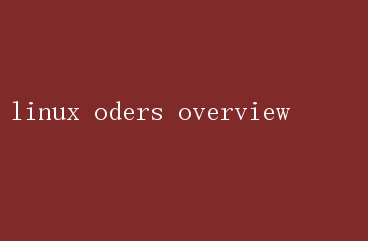Linux命令概览:od工具深度解析
linux oders overview
作者:IIS7AI 时间:2025-01-05 10:30

Linux Orders Overview: Unleashing the Power of Open Source Operating Systems In the realm of operating systems, Linux stands as a towering testament to the ingenuity and collaboration fostered by the open source community. Far from being a mere alternative to proprietary OSes, Linux has evolved into a versatile, robust, and highly customizable platform that powers servers, desktops, mobile devices, and even entire data centers worldwide. This Linux orders overview aims to illuminate the myriad facets of Linux, explaining why it has become indispensable in todays digital landscape and detailing how its diverse ecosystem can cater to a wide array of user needs. The Genesis of Linux Linuxs journey began in 1991 when a Finnish computer science student named Linus Torvalds announced the creation of a free Unix-like operating system on the MINIX newsgroup. His vision was to develop an OS that could rival the commercial Unix systems available at the time, but with the added advantage of being freely accessible and modifiable by anyone. Torvalds kernel, initially named Freax, was soon renamed Linux in honor of its creator. From its humble beginnings, Linux grew rapidly thanks to the contributions of developers around the globe. The GNU Project, led by Richard Stallman, played a pivotal role by providing the necessary userland tools and libraries that complemented Torvalds kernel. Together, they formed the GNU/Linux operating system, often simply referred to as Linux. Core Principles and Advantages Linux is underpinned by four key principles: freedom, openness, collaboration, and community. These principles have driven its development and adoption, making it a formidable force in the tech industry. 1.Freedom: Users are free to use, modify, and distribute Linux without restrictions. This freedom fosters innovation and ensures that Linux remains adaptable to evolving technological landscapes. 2.Openness: The source code of Linux is publicly available, allowing anyone to inspect, audit, and improve it. This transparency builds trust and enhances security, as vulnerabilities can be swiftly identified and mitigated. 3.Collaboration: Linuxs development is a collective effort, with contributions from thousands of developers worldwide. This distributed model of development ensures that Linux remains cutting-edge and resilient. 4.Community: The Linux community is a vibrant network of enthusiasts, professionals, and hobbyists who share knowledge, support each other, and celebrate the successes of the platform. This sense of camaraderie fosters a welcoming environment for newcomers and drives continued growth. Versatility Across Platforms Linuxs versatility is one of its most compelling attributes. It can be tailored to fit the needs of diverse environments, ranging from personal desktops to large-scale enterprise servers. - Desktop Computing: Linux offers a range of desktop environments, such as GNOME, KDE, and XFCE, catering to different user preferences. Its lightweight nature and robust security make it an excellent choice for everyday computing tasks, while its flexibility allows users to customize their experience to the nth degree. - Servers: Linux is the de facto operating system for web servers, email servers, and database servers. Its stability, scalability, and security make it an ideal platform for hosting critical business applications and storing sensitive data. Popular server distributions include Ubuntu Server, CentOS, and Debian. - Cloud Computing: Linux is instrumental in the cloud computing revolution. Major cloud providers like AWS, Google Cloud, and Microsoft Azure offer Linux-based virtual machines and containers. The lightweight nature of Linux, combined with its strong networking capabilities, makes it an excellent choice for scalable cloud solutions. - IoT and Embedded Systems: Linuxs low resource requirements and efficient memory management make it perfect for Internet of Things(IoT) devices and embedded systems. Distributions like Yocto Project and OpenWrt are tailored for these environments, enabling developers to build robust, secure, and scalable IoT solutions. Security and Stability Linuxs security and stability are among its most celebrated features. Due to its open source nature, Linux is constantly scrutinized and improved by a global community of developers. This continuous peer review and auditing process result in a highly secure operating system. - Security: Linux empl